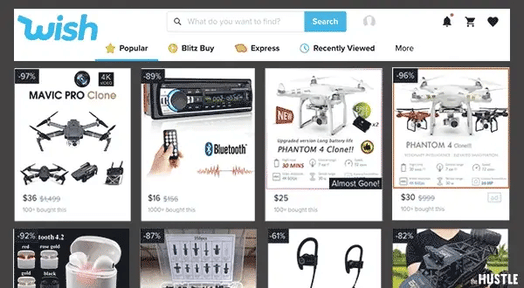Wish, a San Francisco-based e-commerce company, was the most-downloaded e-commerce app worldwide in 2018 — and it is now the 3rd-largest e-commerce marketplace in the world by sales.

Amazon, the king of kombucha, dominates upscale e-commerce with Whole Foods and other big brands. But, on the other hand, Wish scoops up the discounted leftovers, selling generic goods from China to bargain shoppers — and it seems to be working.
Undercutting Amazon… is that an oxymoron?
Amazon is famous for undercutting competitors with rock-bottom prices. But as Amazon has grown, it has rolled out premium features to attract consumers to its pricey annual Prime membership
And, as Amazon has prioritized “Prime” cuts, Wish has doubled down on the e-commerce equivalent of hotdogs — Grade D, but edible, bargains.
Wish’s products are confusingly cheap: Sweaters cost $2, smartphones sell for $27, and knockoff Apple Watches go for $9 a pop.
The ‘Oriental Trading’ of the e-commerce era
The granddaddy of gimmicky wholesale, Oriental Trading, has made money for 9 decades by selling popular low-quality imports from Japan at high volumes in the US (in case you forgot, Warren Buffett’s Berkshire Hathaway owns Oriental Trading).
Wish’s business model takes a glossy page right out of OT’s glossy catalog: Wish pumps inexpensive, usually Chinese-made products to American buyers — offering cheap stuff to consumers and oodles of consumers to retailers.
The average Wish shopper scrolls through 600-700 items before making a purchase, and 80% of Wish buyers return to make a 2nd purchase.
So… can Wish take on Amazon?
For now, yes. Wish is growing faster than its e-commerce competitors thanks to aggressive marketing: Wish is in the middle of a 3-year, $30m deal to sponsor the Lakers (the company loses $190m annually).
But the company struggles with quality control (it culls 8m products every week) and competition (Facebook’s beefing up its sales products and Amazon recently launched its own ‘Bargain finds’ section).
Wish’s goods may arrive weeks late, broken, and counterfeit. But for now, the world’s biggest dropshipper looks like it will keep on shipping away at its e-commerce competition.
